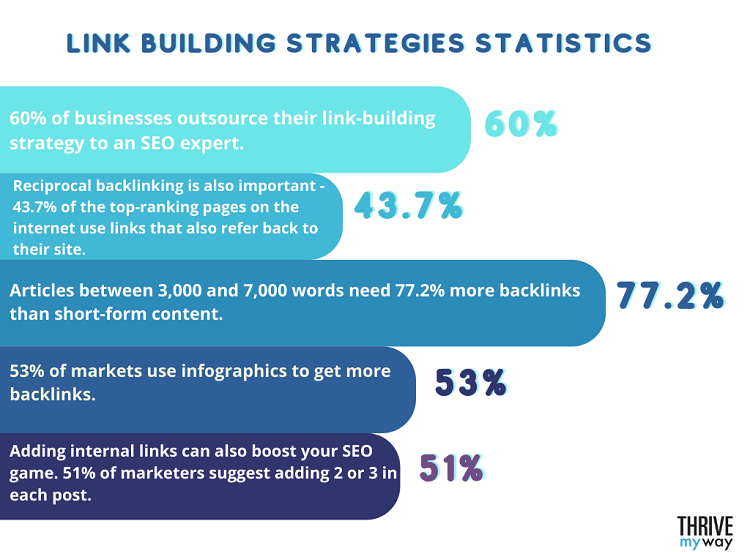Link building is essential if you want to improve your SEO and rank high on Google.
Therefore, these stats about backlinks and link building are important for all marketers and SEO specialists to know.
Table of Contents
ToggleNeed to Know Backlinks and Link Building Statistics and Facts 2024
- Only 22% of content published on the internet will be linked back more than once.
- 53% of SEO experts believe that backlinking will one day be just as important as search.
- At the moment, only 13% of marketers believe external linking is the most important SEO element. 54% believe having quality content is the most effective tactic.
- When it comes to determining backlinking quality, marketers look at a site’s domain authority (65%), domain ratings (48%), and page authority (36%).
- Websites that rank #1 on Google have 3.8x more backlinks than the rest of the top 10 sites.
- 52% of marketers believe that adding backlinks can increase rankings on search engines.
- The most popular tool for link building is Google Search Console (42.3%), followed by Buzzstream (14.8%), and Ahrefs (8.5%).
Backlinks and Link Building Costs Statistics 2024
- 46% of companies will spend $10,000 for SEO link building.
- Most marketers spend anywhere from 0% to 10% of their marketing budget on backlinking.
- Over 40% of markets believe that the cost of adding links will rise in the next few years.
- High authority backlinks can cost upwards of $1,000 each.
- Low-authority backlinks will run anywhere from $150 to $300 per link.
Link Building Opportunities and Challenges Statistics 2024

- 94% of content on the internet never gets backlinked.
- When it comes to SEO practices, 41% of companies believe that backlinking is the biggest challenge.
- 15.6% of companies don’t believe that backlink impacts their brand authority. 5% also say that it’s not an important SEO strategy.
Link Building Strategies Statistics

- 60% of businesses outsource their link-building strategy to an SEO expert. Only 30 % do it in-house.
- Reciprocal backlinking is also important – 43.7% of the top-ranking pages on the internet use links that also refer back to their site.
- Articles between 3,000 and 7,000 words need 77.2% more backlinks than short-form content.
- 53% of markets use infographics to get more backlinks.
- Adding internal links can also boost your SEO game. 51% of marketers suggest adding 2 or 3 in each post.
- List-style articles have the highest number of links (6.19) out of all types of content forms.
You might be interested to check those related posts as well:
- Linkody Review 2024 [Great for Monitoring Backlinks]
- 159 Important SEO Stats 2024 [Facts and Trends]
- Law Firm SEO: 17 Law Firm [Link Building] Tactics 2024
FAQ
How many backlinks do you need to rank on Google?
The number of backlinks you need will depend on numerous factors, including your domain authority and the SEO competition. Some of the top-ranking sites on Google only have a handful of backlinks, while others can have more than 1,000.
But on average, most sites have around 300 links, which is what you should aim for if you want to rank on Google.
How do backlinks impact my domain authority?
You can increase your domain authority by securing links from other high-authority sites.
Quality is more important than quantity, so get rid of bad or spammy links and focus on creating valuable content for your users.
How many backlinks is it safe to create a day?
Generally speaking, there is no limit to the number of backlinks you can create each day. However, you shouldn’t link to low-quality sites, as that could hurt your website and ability to rank on Google.
If you are generating good content, you can have thousands of links and not encounter any problems.
Conclusion
Adding internal and external links to your site can drastically help your SEO performance.
Although it may take some time to understand how to effectively apply backlinking to your marketing strategy, it’s an important tactic that all companies should learn.
Sources:
- Spiralytics
- Hubspot
- uSERP



